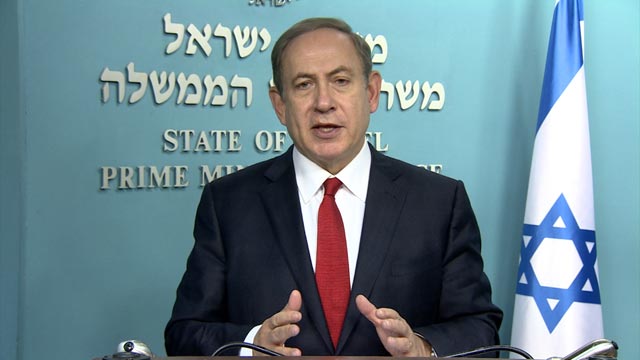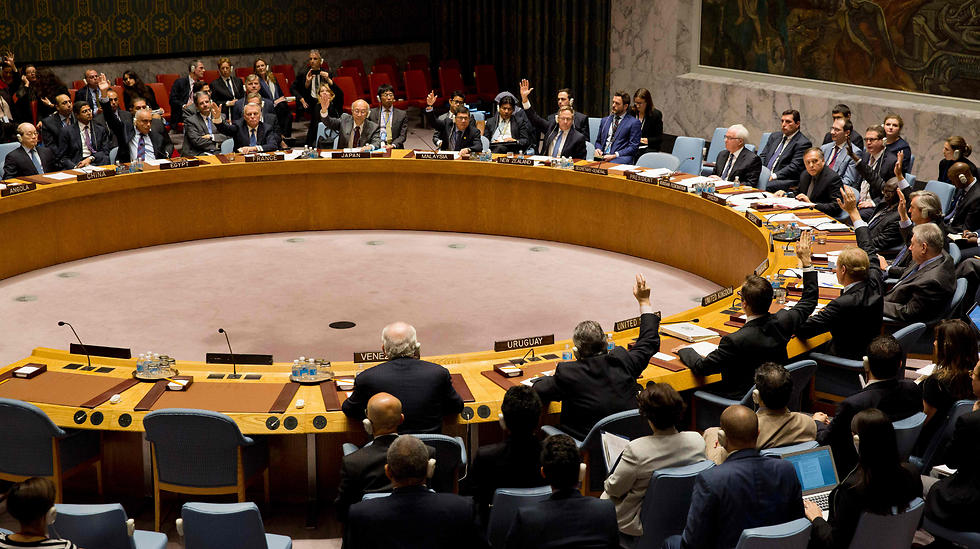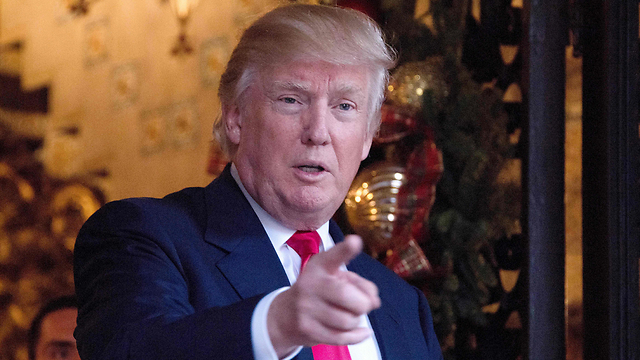UN security council vote on Israeli settlements postponed ‘potentially indefinitely’
Succumbing to pressure from Israel, Egyptian president asks to postpone vote on resolution draft that would demand Israel ‘immediately and completely cease all settlement activities in the occupied Palestinian territory, including East Jerusalem.’
Egypt postponed “potentially indefinitely” a UN Security Council vote on Thursday on a resolution it proposed demanding an end to Israeli settlement building, diplomats said, saying Cairo acted under pressure from Israel.
President Abdel Fattah al-Sisi of Egypt, which in 1979 became the first Arab nation to make peace with Israel, put off the vote because of pressure from Israel, diplomats said.
“Every member of the Security Council was ready to vote at 3pm,” said a Western diplomat on condition of anonymity. “Egypt has delayed the vote following an intense Israeli lobbying campaign against them.”
Any council member can propose a draft resolution. Council member Egypt worked with the Palestinians to draft the text.
It was not clear whether a vote would be rescheduled. Diplomats said a final decision on whether to push ahead with the draft resolution would be made after a meeting of some Arab ministers in Cairo later on Thursday.
Officials in Prime Minister Benjamin Netanyahu’s office spoke to Egyptian officials on Thursday about postponing the vote, an Israeli diplomat said.
It was not clear what pressure Israel may have put on Egypt but there are several ways it could do so, including curtailing Israeli security cooperation in Egypt’s fight against Islamist militants in the Sinai desert.
An Egyptian diplomat suggested Cairo may have put off the vote in part to maintain good relations with the incoming administration of US President-elect Donald Trump.
“We (Arab states) are all looking for a way to ensure constructive relations with this new administration. It’s not clear if this (resolution) helps that, or if it might even hinder,” said the diplomat.
Egypt circulated the draft Wednesday evening and the 15-member council had been due to vote at 3pm (8pm GMT) on Thursday.
The resolution would have demand Israel “immediately and completely cease all settlement activities in the occupied Palestinian territory, including East Jerusalem.”
The draft text says the establishment of settlements by Israel has “no legal validity and constitutes a flagrant violation under international law.”
It expresses grave concern that continuing settlement activities “are dangerously imperilling the viability of a two-state solution.”
Pressure on Obama to veto draft resolution
A vote would have forced US President Barack Obama to decide in his last month in office whether to shield Israel with a veto, or, by abstaining, to register criticism of the building on land that the Palestinians want for a state.
Obama has been considering whether to lay out parameters for a solution or to allow a critical resolution through the Security Council before he steps down in the hopes this might ultimately help to end the conflict.
US Secretary of State John Kerry had planned to make a speech to explain the US stance on Thursday but cancelled it after the vote was postponed, a US official said.
In a sign that they feared Obama might abandon the United States’ long-standing diplomatic protection for Israel at the United Nations, US President-elect Donald Trump and Prime Minister Benjamin Netanyahu urged the White House to veto the draft resolution.
“Israelis deeply appreciate one of the great pillars of the US-Israel alliance: the willingness over many years of the US to stand up in the UN and veto anti-Israel resolutions,” Netanyahu said in a video he released a few hours before the planned vote.


צילום: לע”מ
“I hope the US won’t abandon this policy; I hope it will abide by the principles set by President Obama himself in his speech in the UN in 2011: That peace will come not through UN resolutions, but only through direct negotiations between the parties,” he added.
“And that’s why this proposed resolution is bad. It’s bad for Israel; it’s bad for the United States; and it’s bad for peace.”
Netanyahu also took to Twitter in the dead of night in Israel to appeal to Obama, tweeting at 3:28am that the United States “should veto the anti-Israel resolution at the UN Security Council on Thursday.”
Hours later, Trump, posting on Twitter and Facebook, backed fellow conservative Netanyahu on one of the most contentious issues in the Israeli-Palestinian conflict and the pursuit—effectively stalled since 2014—of a two-state solution.
“The resolution being considered at the United Nations Security Council regarding Israel should be vetoed,” Trump said.
“As the United States has long maintained, peace between the Israelis and Palestinians will only come through direct negotiations between the parties, and not through the imposition of terms by the United Nations.
“This puts Israel in a very poor negotiating position and is extremely unfair to all Israelis,” he wrote.
After Trump’s statement, a US administration official said: “We have no comment at this time.”
Israel’s far-right and settler leaders have been buoyed by the election of Trump, the Republican presidential candidate. He has already signalled a possible change in US policy by appointing one his lawyers—a fundraiser for a major Israeli settlement—as Washington’s new ambassador to Israel.
The United States says continued Israeli settlement building lacks legitimacy, but has stopped short of adopting the position of many countries that it is illegal under international law. Some 570,000 Israelis live in the West Bank and east Jerusalem.
Obama’s administration has been highly critical of settlement construction in the West Bank and east Jerusalem. US officials said this month, however, the president was not expected to make major moves on Israeli-Palestinian peace before leaving office.
Some diplomats hoped Obama would allow Security Council action by abstaining on the vote.
Israeli officials voiced concern that passage of the resolution would embolden the Palestinians to seek international sanctions against Israel.
In Beirut, French Foreign Minister Jean-Marc Ayrault told reporters that Paris was looking at the text of the resolution with great interest.
“The continuation of settlements is completely weakening the situation on the ground and creating a lot of tension,” he said. “It is taking away the prospect of a two-state solution. So this could reaffirm our disagreement with this policy.”
Netanyahu, for whom settlers are a key component of his electoral base, has said his right-wing government has been their greatest ally since the capture of the West Bank and east Jerusalem in the 1967 Six-Day War.
Some legislators in his right-wing Likud party have suggested Israel declare sovereignty over the West Bank if the United States does not veto the resolution. That prospect seemed unlikely, but Netanyahu could have opted to step up building in settlements as a sign of defiance of Obama and support for settlers.
In 2011, the United States vetoed a draft resolution condemning Israeli settlements after the Palestinians refused a compromise offer from Washington.




Artículos Relacionados: